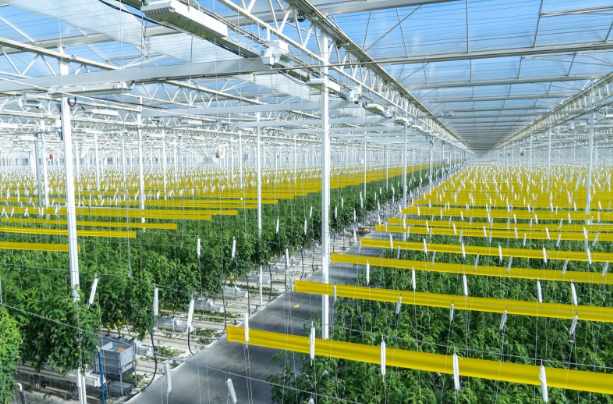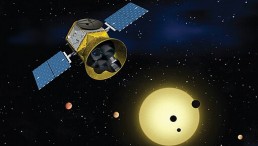As the climate warms, heavy rainfalls are expected to become more frequent and intense, bringing devastating flooding that can wipe out entire fields of crops. Jonathan Webb, the CEO and founder of AppHarvest APPH, believes that high-tech indoor farms are the future of sustainable agriculture.
Webb's $150 million AppHarvest facility features a 60-acre high-tech indoor farm, which he prefers to call "a data-driven farm." That's because the structure that encloses 2.8 million square feet embraces cutting-edge technologies to grow the best tomatoes for a hearty harvest in an environmentally friendly environment. According to Webb, "This under-glass facility can produce the equivalent of 1,800 acres of open-field production."
AppHarvest embraces technology like robotics and artificial intelligence to better predict crop health and yield. "The last big technological revolution in American farming was when the tractor was introduced," notes Webb. "Right now, we're at the next point of a technological revolution in American farming, but instead of tractors, we're going to be talking about AI, data, and robotics."
"Controlled-environmental agriculture is the third wave of technology-led solutions to Earth's environmental crisis. First came the renewable energy grids and electric cars," Webb explains. "AppHarvest will help shore up a United States food supply amid the new, unpredictable weather extremes." According to reports, food production accounts for a third of greenhouse gases, 70% of terrestrial biodiversity loss, 70% of all freshwater use, and 80% of deforestation.
Rainfall is a sustainable resource for AppHarvest.
Webb is confident that AppHarvest can feed the world without destroying it during the growing process. In fact, he and the AppHarvest engineers have figured out how to put the wild weather to work to their advantage. The Morehead, Ky., high-tech indoor farm facility is the first of nearly a dozen Webb plans to build across Central Appalachia. The Bluegrass State is an ideal location for high-tech greenhouses due to its annual rainfall. "I am a huge believer that nature is the most technologically advanced thing we have on planet Earth, and we need to harness it," says Webb. That is exactly what he did by installing a closed-loop irrigation system at the indoor farm that relies 100% on rainwater. "We reduced water consumption by 90% compared to traditional open-field agriculture," notes Webb.
The state best known for the Derby, Daniel Boone, and Louisville Sluggers has had its wettest decade on record, which works to Webb's advantage. Kentucky has the honor of being the most waterlogged state in the U.S. in 2020, which is why Webb hopes to put Kentucky on the map for tomatoes very soon. "Being from one of the largest coal-producing states in the U.S., I saw firsthand the collapse of the coal industry and the rise of renewable energy. Just about every coal company has gone bankrupt in the past 15 years. And renewable energy went from this nascent industry to something huge," Webb says.
Kentucky is also the perfect place to build out AppHarvest because the location cuts down on shipping distances. "We can reduce transportation emissions by approximately 80% since 70% of the U.S. is within a day's drive of Kentucky," notes Webb.
"When you look at the basic pillars of human life, it's water, it's energy, and it's food, and if you don't have those, you don't have a society," says Webb. "They're not 'nice to have'; they're absolutely essential necessities that we must all work to protect."
AppHarvest is focused on fixing environmental problems.
Webb considers it the responsibility of his generation to counteract the climate change crisis. "It's time to stop talking about how to fix the environmental destruction, and take actions to do it," he says. "When people ask me what keeps me up at night, it's thinking about the world we're leaving behind for our kids and grandkids and that we aren't moving fast enough to stop the climate change catastrophe."
Webb prides himself on the fact that his indoor farms can conserve water and avoid agricultural runoff of fertilizers and pesticides. "AppHarvest doesn't use soil," notes Webb. "We utilize a hydroponic system, which allows us to control what goes in and out of our facility." He explains that the computer-controlled robotic data system monitors all aspects of the plant's growth. A proprietary all-natural slurry of water and nutrients is drip-fed directly into their roots to ensure that each fruit achieves its optimal size and ripeness. "This allows us to grow with 90% less water and get up to 30 times more product per acre than outdoor farms," Webb says.
According to Jackie Roberts, the company's chief sustainability officer, those are just two of the ways that AppHarvest is committed to clean energy. "I'm working with Schneider Electric, sustainable energy specialists, on a proposal for putting renewables into the grid," she explains. "The company's long-term goal is minimal carbon emissions."
What's growing at AppHarvest?
Annually, up to 40 million pounds of tomatoes from about 720,000 plants will be harvested from the Morehead indoor farm facility. Each tomato plant is carefully monitored through a control room, where staff keeps track of the temperature, nutrients, water, and light. The indoor farm in the heart of the Appalachian region grows three types of tomatoes: big beautiful beefsteaks, glossy groups of tomatoes-on-the-vine, and cocktail tomatoes perfect for snacking. Webb says that other AppHarvest indoor farms will expand their fruit and vegetable operation and grow produce like leafy greens and strawberries.
* This is a contributed article and this content does not necessarily represent the views of sciencetimes.com















